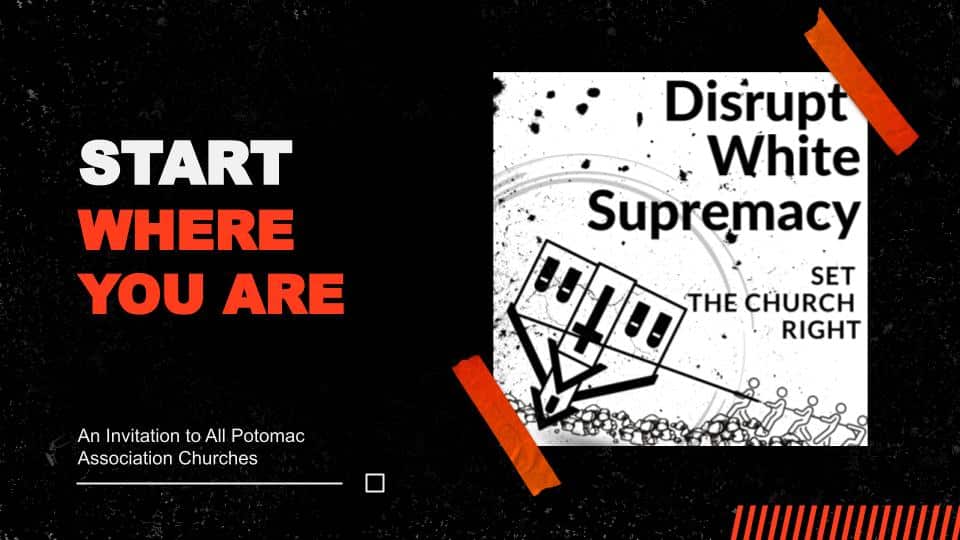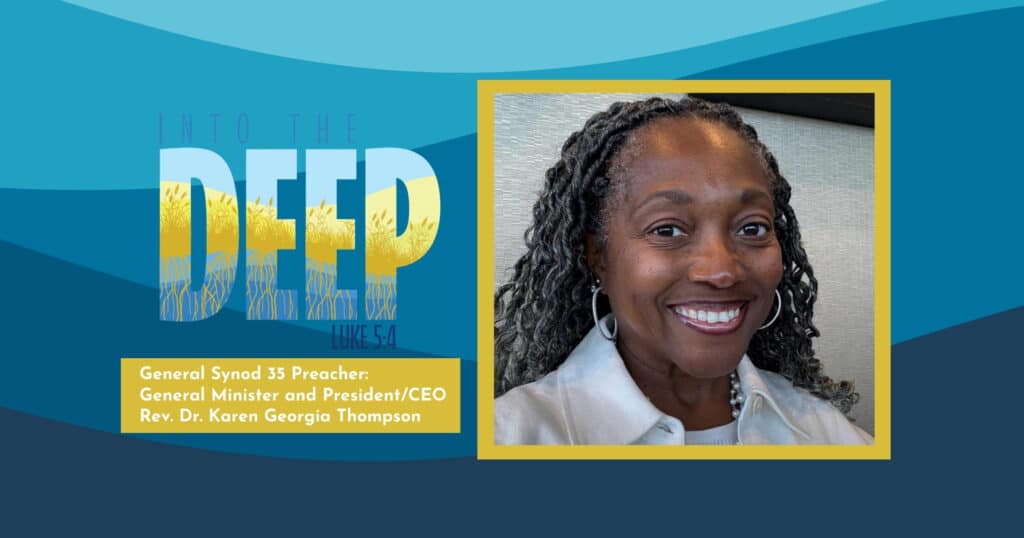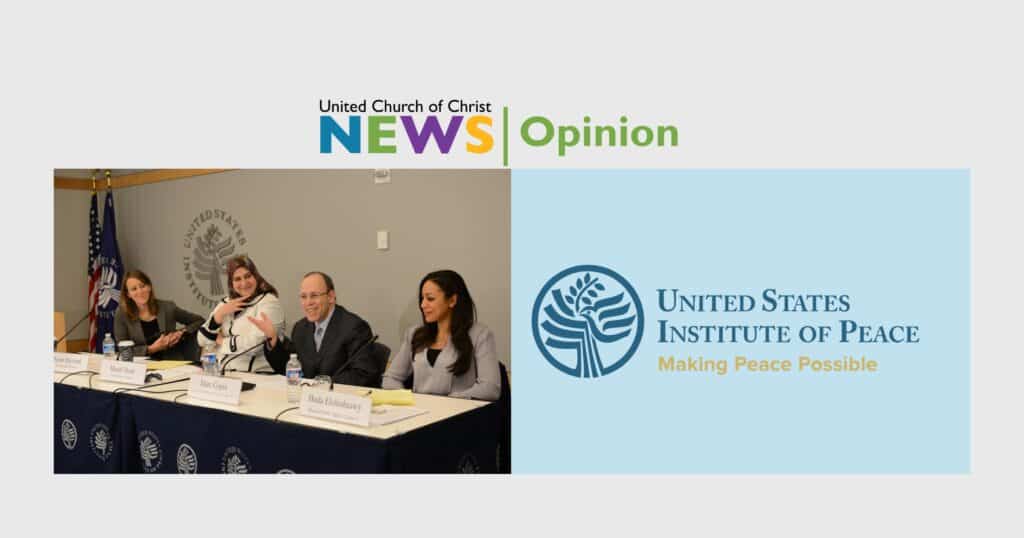Proposed Synod resolution calls on churches to be ‘white supremacy-free zones’
The 2023 General Synod of the United Church of Christ will consider 17 resolutions and several bylaw changes when it meets June 30-July 4 in Indianapolis. This is one in a series of articles about them. Full texts of each of the proposed resolutions are available at the General Synod website.
A resolution calling United Church of Christ congregations to confront white supremacy is all about moving from words to actions.
The proposed resolution calls on local churches to declare themselves a “white supremacy-free zone” and confront racist ideology. It describes racism and white supremacy as forms of idolatry that must be challenged, and that simply declaring “Black Lives Matter” hasn’t done enough.
“Where is the United Church of Christ, visibly and boldly?” asks the resolution sponsored by the Potomac Association and Central Atlantic Conference.
Advocates for racial justice will bring this question before General Synod 34, together with recommendations and tools to inspire collective action.
What is ‘white supremacy-free’?
The idea to claim spaces as “white supremacy-free” aims to encourage congregations across the UCC, particularly those of predominantly European descent, to “put some skin in the game and profess in your local communities where most of these injustices tend to happen that this is a safe space,” said the Rev. Marvin Silver, CAC associate conference minister.
A congregation designated as a white supremacy-free zone would make a commitment to actively engage in anti-racism work. According to the resolution, this would happen through declaration, study and action. It encourages congregations to use a tool for local congregations that currently is being piloted and revised by a CAC committee.
This committee first was formed when the Potomac Association passed an earlier version of the resolution. It consists of a white working group who built the resources and a BIPOC working group who offered review and feedback.

‘Stages of change’
The Rev. Darryl Moch — a ministerial staff member at Inner Light Ministries UCC in Washington, D.C., and a board member of the Potomac Association — chairs the committee with Marty Swaim, member of Rock Spring Congregational UCC in Arlington, Va., and founder of Challenging Racism. Moch said the tool uses a “stages of change” framework. It’s inspired by a mental health and substance use model, he explained, because “people need to go through a process of change” in order to disrupt white supremacy. The model invites congregations to identify their starting stage and commit to a goal of moving to the next one. It incorporates biblical texts throughout to “give us the spiritual foundation we need,” Moch added.
“The tool looks at how change happens in stages and as people are ready,” he said. “As people move through each stage, they can do a different level of inquiry to move through the idea of unpacking the impact and legacy of white supremacy and white privilege that lives inside of all of us.”
The still-developing tool will include a facilitator guide, program manual and participant workbook. It also includes resources for BIPOC congregants to “address the healing of trauma and victimization that BIPOC individuals need to experience” as an important piece of the work to address white supremacy in the church and world, Silver added.
‘Begin the journey’
The committee aims to have a second draft of the resource ready to share at Synod, with a final version available by the fall for use across the UCC.
“As we’re trying to do in Central Atlantic Conference, I’m hoping this will push many of our local churches across the denomination to begin the real journey of what it means to be an anti-racist local church,” said Silver. “That’s the goal. And that they (congregations) recognize that this is not another effort of the church to designate yourself as this type of church. Because anti-racism and confronting white supremacy is not a designation or destination — it is a lifelong journey of becoming.”
Previous Synods have passed 12 resolutions denouncing racism, including one that called on the UCC to be a multiracial church in 1993; one that called the UCC to be an anti-racist church in 2003; and one that established cultural diversity training procedures for ministers in 2017.
Join the Movement for Racial Justice, as part of this tradition, launched as a national UCC campaign at the 2021 General Synod to amplify stories, resources and best practices for anti-racist action.
Time for action
CAC proponents of the proposed resolution hope it can offer a next step for the church to show up more boldly and consistently in local communities.
“If we’re going to be the witness that we say we are, we need to look at ourselves and ask if we’re creating the kind of movement and change that we want to see happen,” Moch said. “I do believe white supremacy and racism are human-made things. They can be corrected and reversed, and we can do things differently. Is it likely? Maybe not. But I believe it is possible that, with the things we’re creating, we really can make a difference. I hold out hope for that.”
“I’m hoping that racial justice truly becomes a priority of the United Church of Christ,” said Silver. “It’s not something we articulate only in word, but that it’s something we actively do. And it’s not seen as something that’s part of the National Setting exclusively, but it’s active, engaged work in churches across the denomination, across the country.”
Find the full text of this resolution and learn more about General Synod 34 here.

The United Church of Christ’s 34th General Synod will be held June 30-July 4 in Indianapolis. For registration, programming, information and more, visit generalsynod.org.
Content on ucc.org is copyrighted by the National Setting of the United Church of Christ and may be only shared according to the guidelines outlined here.
Related News
Thompson to bring a ‘prophetic and pastoral’ message to Synod: ‘We are not all the same, but still one body’
On Sunday, July 13, the Rev. Dr. Karen Georgia Thompson will take the stage at the 35th...
Read MoreSend a prayer shawl along to General Synod 35
There’s been a buzz about Missouri, Kansas – can you hear it? It’s more of a clicking...
Read MoreOpinion: UCC pastor and former Institute of Peace Staffer calls for action in defense of peace
Editor’s Note: The United States Institute of Peace (USIP), an independent institute founded...
Read More



